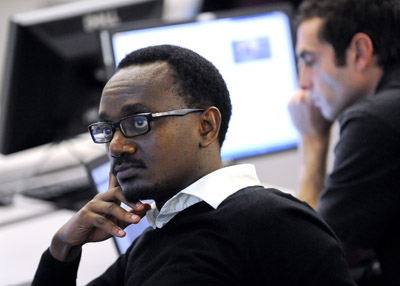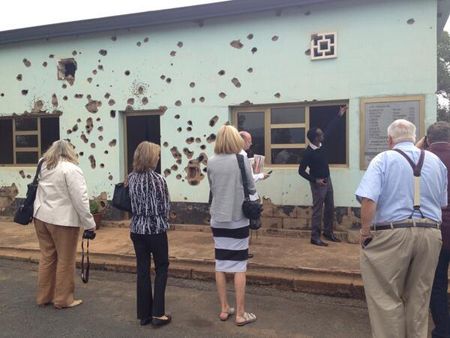
Paul Rukesha
Aegis Trust’s Paul Rukesha helped lead the USC Shoah Foundation mission to Rwanda last week, and reports that the mission was, a very meaningful and productive visit for all involved.
Rukesha is part of Aegis Trust’s effort to develop the Genocide Archive of Rwanda at Kigali Genocide Memorial (KGM), similar to the Visual History Archive. He has spent time at the Institute’s offices in Los Angeles to share his expertise with USC SF staff and to index the VHA’s current collection of testimonies from survivors and witnesses of the Genocide Against the Tutsi. He also engaged with other colleagues, in training on indexing methodology and archive building to strengthen KGM’s capacity to record, index and digitally preserve testimonies in the future.
On the mission to Rwanda, supporters, staff and guests of the USC Shoah Foundation visited memorial sites, observed IWitness in action in school locally, and attended the Kwibuka20 commemoration ceremony, among other activities. Rukesha said his goal was to help the mission participants understand Rwandan history throughout the pre-colonial, colonial and post-colonial periods, and he highlighted how Rwanda’s history led to cycles of violence which culminated in the genocide against the Tutsi in 1994.

“I wanted the participants to get a picture of what the Rwandan society is, and also to admire the beauty of the country through its people, culture, landscape, and its history,” Rukesha said. An excursion to see Rwanda’s famed mountain gorillas was particularly exciting for many of the guests, he said.
Rukesha said the guests engaged in discussions and questions about how survivors and Rwandan society have rebuilt since the genocide, and how people will continue to find unity and reconciliation.
(Above: Rukesha guides mission guests through memorial sites in Rwanda)